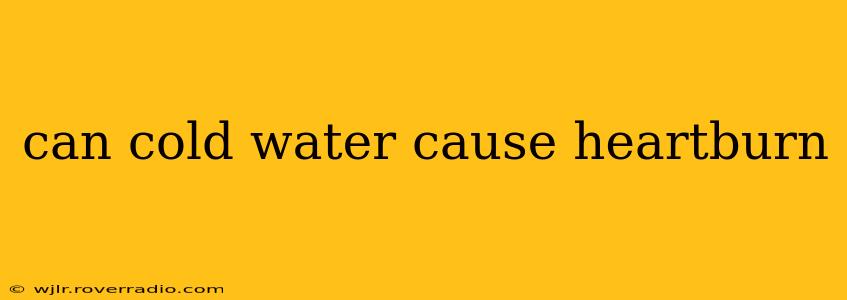Heartburn, that burning sensation in your chest, is a common discomfort. While many associate it with spicy foods or large meals, the question of whether cold water can trigger heartburn is surprisingly complex. The short answer? It's unlikely that cold water directly causes heartburn, but it can indirectly influence your symptoms. Let's explore why.
What Causes Heartburn?
Before we delve into the role of cold water, understanding the root cause of heartburn is crucial. Heartburn, medically known as gastroesophageal reflux disease (GERD) or acid reflux, occurs when stomach acid flows back up into the esophagus. This happens because the lower esophageal sphincter (LES), a muscular valve at the bottom of the esophagus, weakens or relaxes inappropriately. Several factors can contribute to this:
- Dietary Factors: Spicy foods, fatty foods, chocolate, caffeine, alcohol, and carbonated drinks are common culprits.
- Lifestyle Factors: Overeating, eating too close to bedtime, smoking, and stress can all exacerbate heartburn.
- Medical Conditions: Hiatal hernia (where part of the stomach protrudes through the diaphragm), obesity, and certain medications can increase the risk of GERD.
Can Cold Water Trigger Heartburn? The Likely Answer is No, but…
While cold water itself isn't directly acidic and won't directly cause heartburn, it can affect your digestive system in ways that might indirectly contribute to or worsen existing heartburn. Here’s how:
Does Cold Water Increase Stomach Acid Production?
No, cold water doesn't increase stomach acid production. The body regulates stomach acid production based on food intake and other factors, not the temperature of the water consumed.
Can Cold Water Relax the Lower Esophageal Sphincter (LES)?
There's no direct evidence supporting this. The LES's function is primarily influenced by hormonal and neural factors related to digestion, not water temperature.
How Could Cold Water Indirectly Affect Heartburn?
The indirect effects are more likely related to the overall impact on digestion and stomach pressure:
-
Increased Stomach Pressure: Drinking a large volume of cold water quickly can temporarily increase pressure in the stomach. This increased pressure could potentially push stomach acid back up into the esophagus in individuals already prone to reflux. However, this is a temporary effect and not a consistent trigger for heartburn.
-
Aggravating Existing Symptoms: If you are already experiencing heartburn, the sudden temperature change from cold water might momentarily exacerbate your discomfort. This isn't because the cold water itself is causing the heartburn, but rather because it’s adding to existing irritation.
-
Mask other Underlying Issues: Cold water consumption might temporarily relieve indigestion or other similar discomfort symptoms masking a possible underlying health condition. This should never be misinterpreted as a permanent solution.
Other Related Questions:
Does drinking water help with heartburn?
Drinking water, regardless of temperature, can sometimes help dilute stomach acid and potentially ease mild heartburn. However, this isn't a guaranteed solution, and large volumes of water might increase stomach pressure, potentially worsening the issue.
What are other common heartburn triggers?
As mentioned earlier, common heartburn triggers include fatty or greasy foods, spicy foods, chocolate, coffee, alcohol, carbonated drinks, and citrus fruits. Stress, smoking, obesity, and certain medications can also play a significant role.
When should I see a doctor about heartburn?
If you experience frequent or severe heartburn, particularly if it’s accompanied by other symptoms like difficulty swallowing, persistent nausea, vomiting, or weight loss, consult a doctor. These could indicate a more serious underlying medical condition.
In conclusion, while cold water is not a direct cause of heartburn, its consumption habits coupled with existing conditions and other triggers could potentially worsen symptoms indirectly through increased stomach pressure or by exacerbating existing discomfort. If heartburn is a persistent problem, addressing underlying causes and lifestyle factors is crucial for long-term relief.
